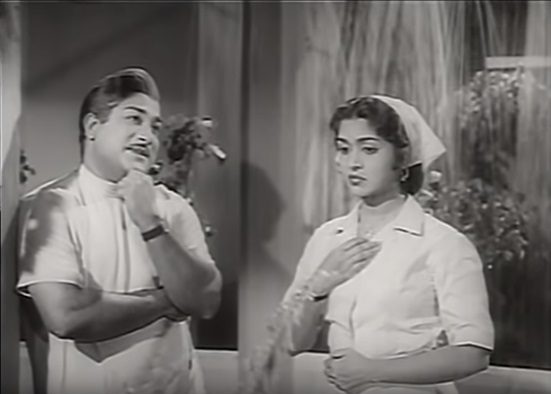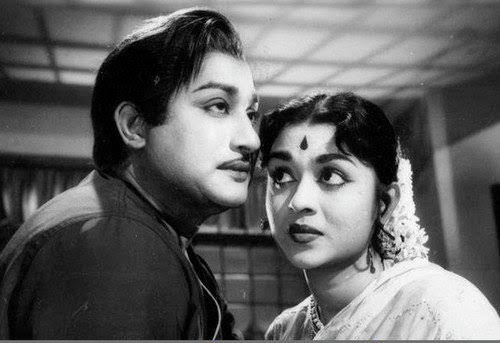This is part of a series where Silverscreen recommends films, documentaries, shorts, songs or scenes from seminal films that make for a compelling watch.
A Bhimsingh’s Paalum Pazhamum stands tall on the shoulders of two women who make the ultimate sacrifice, both onscreen and off. Though Sivaji Ganesan and MR Radha get star billing in the film credits (a clear injustice), it is Saroja Devi and Sowcar Janaki (whose names appear after the male actors, even those playing supporting roles) who embody everything the film wants to convey.
Saroja Devi as Shanthi is a Florence Nightingale type character who dedicates her time and life to the needs of others. Sivaji Ganesan’s Ravi, an orphan who grows up to be a cancer specialist, is yet another person who initially needs Shanthi in his life. Later, he allows her to tend to him, as she does her patients.
The couple shares similar goals. In an early scene, Ravi acknowledges Shanthi’s potential to become a doctor. Soon after, there’s a marriage proposal, in a hospital patio that looks like a gazebo. Rain pours down on the building as Ravi, clearly smitten with Shanthi, makes an offer of marriage. Would he have done so if Shanthi were not so servile? One thinks not.
A series of emotionally debilitating incidents are explained away as fate. Absolutely nothing is in Ravi’s control. His slavish devotion to the people who raised him effectively ensures that all his important life decisions are influenced by them. Thankfully, his foster parent is blessed with an objective mind. And only this prevents Ravi from committing to potentially disastrous moves out of love.
Paalum Pazhamum offers a first hand, if somewhat obtuse, look at the psyche of orphaned men and women. In Bhimsingh’s world, these people devote themselves to the ones who raised them, often too willing to overlook personal losses for a chance at pleasing their foster parents. Ravi and Shanthi do this in different ways. Both are in the public health sector. A life devoid of the absolute conviction about oneself – largely due to the lack of parental love – forces them to look for meaning outside. Ravi does this by vowing to find a cure for cancer while Shanthi takes to mothering patients at the hospital. Eventually, she finds a parent-like figure who offers her solace and also brings an end to what looks like a complicated love triangle.
The film can become overwrought at times, brimming with pain and suffering. There’s unrelenting sadness at one point as Ravi seemingly loses his first love and eventually, his sight. Curiously though, there’s no self pity. As an invalid, he remains sane and strong, albeit one consumed by memories of Shanthi.

The first half of Paalum Pazhamum does not focus on the courtship of Ravi and Shanthi, tepid as it is. Compared to other films of Sivaji Ganesan, the romance here does not take centre stage. The focus remains firmly on the many sacrifices Ravi and Shanthi make to remain together. Even though Ravi pines for her, his actions speak otherwise. He marries again. Later, he does not recognise the voice of the person he says he still loves, which brings us to question the extent of his feelings for her.
It looks like Ravi, whose career as a cancer specialist sees him confront failure at close levels, wanted for once to save somebody. And the unfortunate recipient of such an action is the equally needy Shanthi, who misunderstands his actions for love. She misinterprets her own feelings of gratefulness as love, too. And in the end, Ravi and Shanthi are convinced that they love each other.
Another sacrificial lamb in this film about them, is Sowcar Janaki’s Nalini. She has loved Ravi for the longest time but he does not reciprocate. She is heartbroken when she hears of his first marriage. When there is an opportunity for her to get what she wants, she does so, vowing to make sure that the relationship with Ravi succeeds. But she does not understand the man Ravi is, or the path he is on. She is normal in this film, born into a wealth family, well-adjusted. She is not blessed with the sort of understanding or the shared ideals that Shanthi and Ravi have.
Shanthi knew that for all of Ravi’s posturing – ultimately, his research would be priority. Nalini, on the other hand, wants to be priority. With a difficult man such as Ravi, such a thing is not possible.
*****
The music for Paalum Pazhamum reflects the thread of melancholy that runs through the film. Even the pleasant ‘Aalayamaniyin Osaiyai‘ by P Susheela and the melody of ‘Naan Pesa Ninaippathellam‘ leaves one with a slight feeling of discontent. ‘Intha Nadagam‘ and ‘Kadhal Siragai‘ are sorrowful numbers that lament about love and loss. Susheela’s honeyed vocals acquire tremendous power as she sings of a married woman made a maiden again (‘kalyaanam aanavalai kanni pol aakivittai‘) and of a new suitor being chosen for her thaali by her own husband. The Subhapantuvarali, a raga traditionally associated with auspiciousness in North India, is put to stunning use by music composer MSV in a track that is anything but auspicious. This subverting gives splendid results – the last and finest song, in an album full of them.
The dapper Prem Nazir makes a special appearance in Paalum Pazhamum as Ravi’s brother, Sekhar. They are not siblings as such. Ravi is an orphan. Sekhar could very well be one, for all the attention he gets from his fraud of a father, played by MR Radha. Even this bond is momentarily shaken as Sekhar begins to form a romantic attachment to the nurse who is looking after his brother. This is Shanthi masquerading as Neela. Tumultuous occurrences are prevented by the entrance of Shanthi’s twin, who is promptly married off to Sekhar, yet another sacrificial lamb at the altar of fate and mortal men.
At least two lives are disrupted for Ravi and Shanthi to be one again. Nalini files for divorce from Ravi and takes off to Switzerland to work with the Red Cross. Shanthi’s twin marries a man who fell in love with her lookalike sister. Does she know she is the consolation prize?
Even Ravi and Shanthi’s lives may be changed forever. Shanthi knows that Ravi was ready to give her off as a ‘prize’ to his younger brother. She knows that he never really recognised her. She knows that he married again and so soon. But she continues to stand by him. But the dynamics have changed.
From savior, Ravi has now become an equal.
At the end of Paalum Pazhamum, quite tellingly, we do not see scenes of Ravi, Shanthi and their offspring. This picture of domesticity is not what Bhimsingh is after. Instead, we see Ravi and Shanthi doing what they do best: finding a cure for cancer.
*****
Also read:
‘Aalayamani’, a 1962 Sivaji Ganesan Film That Inspired Two Remakes
KR Vijaya’s Moving Performance In ‘Kurathi Magan’
‘Vadukkunokiyanthiram’, A Dark Comedy From The ’80s That Has The Feel Of An Indie Film
Recommended
‘Aasai Mugam’, A 1965 Film With A Plastic Surgery Plot Twist
‘Panam’, A Reformist Social Drama With M Karunanidhi’s Dialogues
The Timelessness Of Onnu Muthal Poojyam Vare
‘Before My Eyes’, Mani Kaul’s Ode To Kashmir
A Group Of Youngsters Dissect The Idea Of India In ‘I Am 20’



